Search Fellows
Click on a Fellow below to view more information or create your own search.
William T. Dickens
Northeastern University
Visiting Scholar
2008 to 2009
William T. Dickens, Professor, Northeastern University, and Non-Resident Senior Fellow at the Brookings Institution, James R. Flynn, Emeritus Professor at the University of Otago, New Zealand, and Richard E. Nisbett, Theodore M. Newcomb Distinguished University Professor at the University of Michigan, will form a working group to develop a multi-level model of intelligence that explains the role of genes and physiology along with the role of environment in making individuals intellectually able..
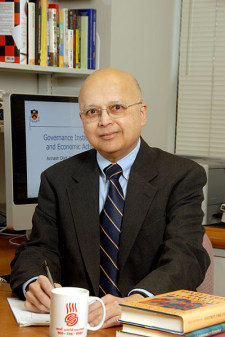
Avinash Dixit
Princeton University
Visiting Scholar
2002 to 2003
Avinash Dixit, the John J. F. Sherrerd '52 University Professor of Economics at Princeton University, will study alternative, non-state modes of economic governance. Much of economic theory assumes that an official legal system provides requisite governance for all economic transactions. Dixit will argue, however, that formal governance is a rarity, approximated only in a few advanced countries and only in recent times. In most countries and at most times, formal governance has been lacking, corrupt, or too slow to be effective.

Greg J. Duncan
University of California, Irvine
Margaret Olivia Sage Scholar
Greg Duncan is Distinguished Professor of Education at the University of California, Irvine.

Greg J. Duncan
University of California, Irvine
Margaret Olivia Sage Scholar
Greg Duncan is Distinguished Professor of Education at the University of California, Irvine.

Greg J. Duncan
Northwestern University
Visiting Scholar
2004 to 2005
Greg Duncan, Edwina S. Tarry Professor of Education and Social Policy at Northwestern University, will write an accessible, non-technical book profiling Milwaukee's successful New Hope project, arguing that similar support programs for low-wage workers can and should be developed to assist people in climbing from poverty. He will also continue research investigating how the random pairing of college roommates with different ethnic and socioeconomic backgrounds impacts students’ views on racial and economic issues.

Greg J. Duncan
University of California, Irvine
Visiting Scholar
2016 to 2017
Duncan will study a number of programs that aim to increase the academic achievement of low-income children and youth. He will examine whether these interventions remain effective in the long run, and whether they help restore some of the social mobility that has been lost over the past several decades. He will develop a conceptual framework that identifies the early-childhood environments and practices that help youth develop skills, make the most of educational opportunities, and avoid risky behaviors later in life.

Greg J. Duncan
University California, Irvine
Visiting Researcher
Greg Duncan is Distinguished Professor of Education at the University of California, Irvine. He was a visiting scholar at RSF during the 2016-2017 academic year and is co-editor of the RSF books Whither Opportunity?, For Better and for Worse, Neighborhood Poverty Volume 1 and Volume 2, Consequences of Growing Up Poor, co-author of the RSF book Higher Ground, and the recipient of multiple grants from the foundation.
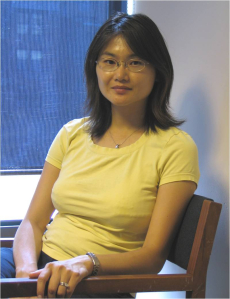
Lena Edlund
Columbia University
Visiting Scholar
2006 to 2007
Lena Edlund, Associate Professor of Economics at Columbia University, will use data from hospitals to examine how the incidence of child abuse varies by children’s age, gender, and their parents’ socio-economic level. She will present her findings in three research papers examining child physical abuse, sexual abuse, and Sudden Infant Death Syndrome (SIDS).

Stuart W. Elliott
Carnegie Mellon University
Visiting Scholar
1997 to 1998
Stuart W. Elliott, research fellow at Carnegie Mellon University, investigated the potential for commercial computers to replicate human work skills in the coming decades. Drawing on the latest research in computer science and analyses of occupational skill levels, Elliott assessed the implications of computerized labor for economic production and employment. Will computers compete only with lesser skilled workers, and if so, what portion of the current labor force would they displace? How would the productivity of higher skilled workers be affected?

John Ermisch
University of Essex
Visiting Scholar
2007 to 2008
John Ermisch (Spring 2008), Professor of Economics at the University of Essex, U.K., will study intergenerational mobility, focused on how family formation and parental behavior affects children’s subsequent socioeconomic mobility. He will employ two large data sets to investigate what types of parent-child interactions during a child’s preschool years are conducive to later educational and economic success. He will also examine how parental income, education, socio-economic status, and marital status affect child outcomes.

Erik Eyster
London School of Economics
Visiting Scholar
2012 to 2013
Eyster and Matthew Rabin will investigate the nature of learning and information transmission in social and economic settings. Eyster will continue his work on the way people use data to make investments, including their understanding of statistical correlation and the inferences investors make from declining stock prices and experience with a firm’s product.
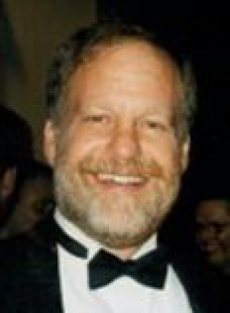
Henry Farber
Princeton University
Visiting Scholar
2002 to 2003
Henry Farber, the Hughes-Rogers Professor of Economics at Princeton University, will pursue three studies on: (1) the effect of the decline of unions in the economy on the wages of non-union workers; (2) strategic behavior in union representation elections; and (3) the labor supply of New York City taxi drivers. Most work on the decline of unions in the U.S. has focused on union workers. Most workers are not unionized, however, and Farber hypothesizes that the long-term decline of unions has had substantial effects on these workers as well.
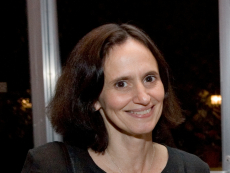
Raquel Fernandez
New York University
Visiting Scholar
2006 to 2007
Raquel Fernandez, Professor of Economics at New York University, will explore the relationship between gender inequality, marital sorting, and the intergenerational transmission of inequality. Using a variety of U.S. and international data sets, she will examine whether and how improvements in the employment prospects for women affect their decision about if, when, and whom to marry.
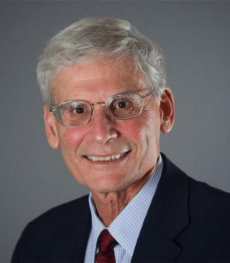
Gary S. Fields
Cornell University
Visiting Scholar
1997 to 1998
Gary S. Fields, professor of labor economics and economics at Cornell University, prepared a book manuscript on Poverty, Inequality, Well-Being, and Economic Growth. He combined empirical evidence from developing and advanced countries with the latest theoretical methods to analyze the effects of economic development on poverty, labor market conditions, and economic well-being. Fields' interpretation of economic progress built on such questions as: Who benefits more from economic growth and why?
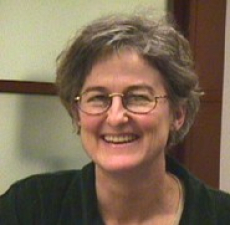
Nancy Folbre
University of Massachusetts, Amherst
Visiting Scholar
2005 to 2006
Nancy Folbre, Professor of Economics at the University of Massachusetts, Amherst, will extend her previous estimates of the economic value of family work by comparing the time devoted to family care in four English-speaking countries and examining the amount of labor (both paid and unpaid) that Americans supply in caring for others. Folbre will parse data from several recent surveys on people’s incomes and their use of time to get a more accurate picture of the differences in standards of living between households with and without children.
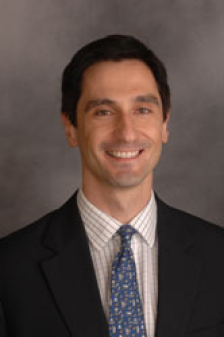
Xavier Gabaix
Massachusetts Institute of Technology
Visiting Scholar
2002 to 2003
Xavier Gabaix, assistant professor of economics at Massachusetts Institute of Technology, will research a model of bounded rationality for use in economics, finance, and policy. In the traditional rational model, people think without limitations, have a perfect understanding of the world around them, and pursue their goals under optimal circumstances. In reality, however, people do not always make the best possible decisions; they usually make an educated guess and hope for the best, especially when time constraints preclude a complete analysis of every conceivable option.
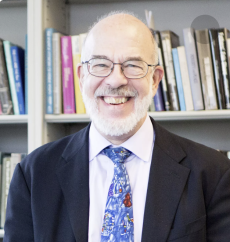
Irwin Garfinkel
Columbia University
Visiting Scholar
2005 to 2006
Irwin Garfinkel, Mitchell I. Ginsberg Professor of Contemporary Urban Problems at Columbia University, will be at the Foundation during the fall semester to co-author a book about the U.S. welfare state that will measure the size and scope of welfare expenditure, document its historical development, and provide international comparisons. The book will be intended for a lay audience and will explore issues such as whether welfare states undermine or support economic productivity and whether government transfers crowd out private assistance.

Paola Giuliano
University of California, Los Angeles
Visiting Scholar
2012 to 2013
Giuliano will research the long-term effects of living through economic downturns. In particular, she will examine whether people who experienced macroeconomic shocks at a young age have different political and economic beliefs from people who did not experience such shocks. She will explore attitudes on wealth redistribution and support for different types of welfare regimes. She will also continue her research looking at the origin of differences in norms about gender roles in society.

Paola Giuliano
University of California, Los Angeles
Visiting Scholar
2016 to 2017
Giuliano will study the effects of culture on the intergenerational mobility of immigrants in the U.S. She will examine the extent to which the cultural values of different national-origin immigrant groups are associated with their varying levels of economic and educational success. She will also look at how cultural beliefs and values can increase or decrease their chances for upward mobility.

Pinelopi Koujinou Goldberg
Princeton University
Visiting Scholar
1998 to 1999
Pinelopi Koujinou Goldberg, assistant professor of economics at Princeton University, will investigate how the growth in international trade has affected American workers of different skill levels. Goldberg uses the exchange rate, which has varied considerably and is highly correlated with import prices, as a measure of trade levels, and draws parallels with changes in American wages and employment. She examines which workers have lost jobs and why, the relative length of unemployment, and the sources of new jobs.
